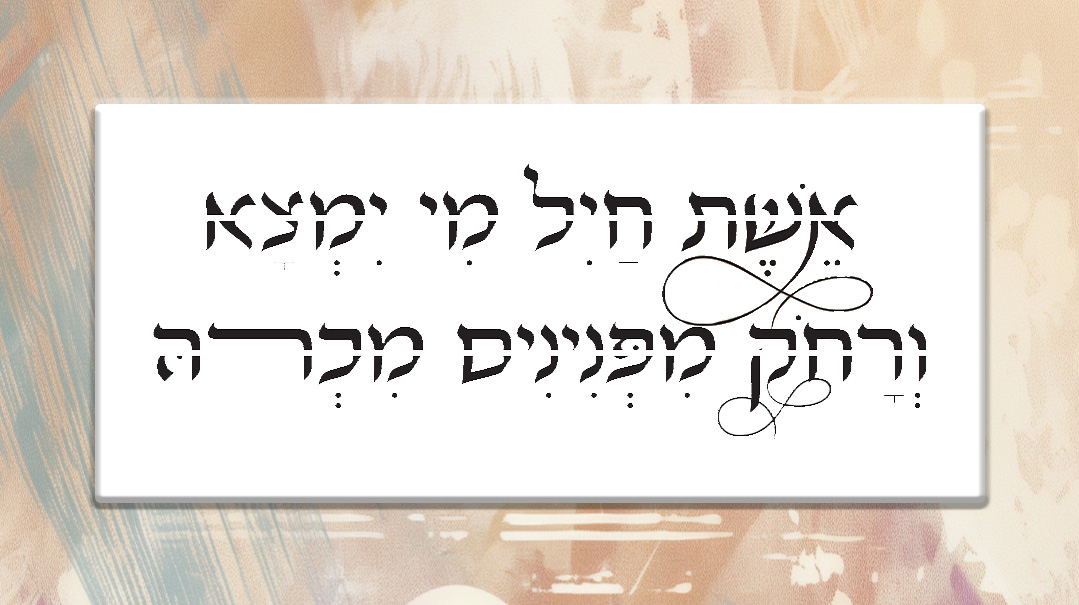Eishes Chayil: 3 Views
| May 28, 2024By learning Eishes Chayil together, we can become that good woman that Chazal praise

Eishes Chayil: 3 Views
Mrs. Shira Hochheimer
1
IN many homes, Eishes Chayil is said on Friday night. Why do we take the time, as the malachim are there, before we acknowledge the holiness of the day with Kiddush, to say this poem about a woman?
There are a few explanations — some mefarshim say that Shabbos is the partner of the Jewish people and so we are praising it. Others say that we are describing the Shechinah, which is present on Shabbos. Still others say that Eishes Chayil is an allegory for the Torah. We remember the giving of the Torah on Shabbos by singing Eishes Chayil.
The Torah, the Shechinah, Shabbos are the most elevated, spiritual realities in our world. And yet there is a very practical message for us in the choice to say Eishes Chayil on Friday night. Says Rav Schwab (paraphrasing Yevamos 63b), “How good must a good woman be that Shlomo Hamelech can find no better analogy for the virtues of the Torah than a good woman.”
The Jewish woman is held as the example of goodness. This shows us the greatness of our potential. By learning Eishes Chayil together, we can become that good woman that Chazal praise.
2
Rebbetzin Debbie Greenblatt
Let’s explore the meaning of Eishes Chayil as it applies to the Jewish woman. She may be a single woman pursuing an education or working in the world, a mother wanting to pass on our precious mesorah as she raises the next generation of Klal Yisrael, a wife building her marriage and her home, or some combination of the above. The strengths of the Jewish woman need to be understood, cultivated, and called upon in all the realms and life situations in which a Jewish woman finds herself.
3
Rebbetzin Shira Smiles
Who is this mysterious woman to whom Shlomo Hamelech dedicated the last chapter of Mishlei? We find different approaches among the commentators. The Midrash Tanchuma tells us that Avraham Avinu composed these words as a eulogy in honor of Sarah Imeinu.
“Mimerchak tavi lachma — from afar she brings her sustenance.” Sarah came “from afar” to join Avraham on his physical journey to Eretz Yisrael. “Darshah tzemer u’fishtim — she seeks out wool and linen.” More significantly, as one separates fibers to create pure, quality fabric, Sarah Imeinu sought to separate Yitzchak Avinu and Yishmael, acting as Avraham’s partner to refine and mold the spiritual dynasty of the Jewish people.
Alternatively, the Midrash Shochar Tov interprets this chapter as referring to various righteous women that we find in Tanach. We will see how each pasuk highlights various dimensions of each personality and study how the timeless lessons of Shlomo Hamelech can relate to all of us.
אֵשֶׁת חַיִל מִי יִמְצָא
וְרָחֹק מִפְּנִינִים מִכְרהּ
Set for Success
The first pasuk of Eishes Chayil tells us that the eishes chayil is a rare model of a person. She’s challenging to find and cannot be bought. Yet Shlomo Hamelech seems to contradict himself a few pesukim later when he says rabos banos asu chayil. Rav Berel Povarsky addresses this contradiction, explaining that the key is the word asu, make. Many women have the potential to do acts of chayil, to do good things. The term eishes chayil, in contrast, describes the essence of the person. Her very being is that of an eishes chayil, at all times and all circumstances — and to find someone who has become like that is very rare indeed.
I may not be an eishes chayil yet, but I can work to get there by doing acts of chayil, making the choices the eishes chayil would make. The opportunity presents itself each week.
The Ben Ish Chai tells us that come Friday afternoon, the satan makes it his business to try to create as much machlokes and division in every home. The wise person will remember this and try not to fall into his trap. Instead of getting upset, we can choose a different path. Your four-year-old spills soda right before candlelighting? It wasn’t him, it was the satan. Your husband walks through the door half an hour before candlelighting? It’s not him, it’s the satan. The kids fight over their seats on Friday night?
After I learned this Ben Ish Chai, my husband and I sat down and looked at the sticking points on Friday. Somehow setting the table had become the battleground for every major fight on Erev Shabbos.
We decided that we’d be mechanech our kids to set the table the other six days a week, but setting the table on Friday, wasn’t chinuch — it was torture. My husband would set the table. I also realized that my last-minute extra Shabbos dish, lichvod Shabbos of course, was driving everyone crazy. Our Friday night menu is now boringly simple, but now the satan can’t just set up camp in the kitchen. (He finds other areas but just not there!)
When we choose to stay calm and happy in the face of all those Erev Shabbos crises, we’re winning. We are making ourselves chayil — and eventually, we will then become that eishes chayil.
Something to think about: How can I set myself up for success on Friday so I am less likely to get upset when the satan gets a hold of my kids, husband, siblings, or parents, who will drive me crazy?
Shira Hochheimer is the author of Eishes Chayil: Ancient Wisdom For Women of Today, a presenter for Torat Imecha Nach Yomi, and an administrator for WITS in Baltimore, MD.
Rare Vision
I’ve long maintained that there is nothing greater than a Jewish woman. Every Jewish woman I have ever met is beautiful and strong. It is her strengths and her unwavering faith that have kept Klal Yisrael going, replanting and rebuilding in each new location as we have traversed the globe through this long exile.
And yet, in Shlomo Hamelech’s ode to the Jewish Woman, he speaks of the rarity of the woman of valor. Mi yimtza, who can find her? — she seems rare indeed. This needs to be understood.
Perhaps her attributes aren’t so rare, what’s rare is knowing how to not only identify her strengths, but to apply them aptly, while retaining the unique character of the Jewish woman. The Jewish woman recognizes the spiritual consequences of her choices and has a forward-looking vision that can help her recognize where those choices will lead her, whether they will bring her in alignment with Hashem’s vision.
Shlomo Hamelech’s mother exemplified that vision. Eishes Chayil appears in the last perek in Sefer Mishlei. This chapter begins with Batsheva’s words of mussar to her son Shlomo. Her words are strong and clear. The Me’am Loez points out that she’s not cowed by the fact that her son is king, or that he’s the wisest of all men. She understands that all people need to have their behavior mirrored back to them on occasion, so they can see themselves and make corrections before they go off course.
Her words remind her son that yiras Shamayim is the most important thing, even for a king, and point out behaviors that remove a person from growing in their devotion to Hashem. She describes to her son what a society led by a king who fears Heaven looks like. These introductory verses are a demonstration of the ability of the Jewish woman to recognize the spiritual consequences of her own choices, and sometimes of those closest to her.
It’s a testament to the humility of Shlomo Hamelech that he not only accepts his mother’s rebuke, but records it in Mishlei, and according to the Metzudas Dovid, writes Eishes Chayil to honor his mother and record her legacy for all to learn from.
Debbie Greenblatt is a senior lecturer for the Gateways organization and a teacher of both the observant and the not-yet-observant. She is also Director of Education at Core.
Companion to Complement
The Midrash begins by noting that the first pasuk refers to the quintessential eishes chayil, Sarah Imeinu, who was perfectly attuned to her mate, Avraham Avinu. They worked in tandem to spread the mission of tzedakah and chesed wherever they went.
“Mi yimtza — Who can find [this woman]?” Just as Hashem paired Avraham and Sarah, He will find a companion for each tzaddik to complement him perfectly and help him fulfill his tafkid. Part of Sarah Imeinu’s greatness was her ability to focus on a singular purpose: to be mekadesh Sheim Shamayim.
Rav Soloveitchik points out that once Sarah Imeinu died, Avraham Avinu had two last missions to complete: purchasing a family burial plot and arranging a match for Yitzchak Avinu. After that, we hear very little about Avraham Avinu’s endeavors, although he lived for many more years. It seems, then, there was a covenantal interdependence between Avraham and Sarah; once she passed on, his active work faded into the background.
To strengthen this idea, the Midrash offers a further example of another couple who worked together and complemented each other in their quest for righteousness. We find that Naamah, the wife of Noach, was worthy of being saved from the flood in her own merit. Rav Ki Tov in Sefer HaParshiyos maintains that while Noach taught his sons the path of goodness and virtue, Naamah simultaneously taught their wives, uplifting them to become worthy of salvation as well. Fittingly, the root of her name is na’im, pleasant, as Naamah spread benevolence and goodwill to those around her. According to the Malbim, “Eishes chein tismoch kavod — a gracious woman draws near to honor,” (Mishlei 11:16) thus a man will achieve esteem with the support of a wife who embodies grace and generosity.
It’s the fusion of noble women and men which enables them to bring the world to a better place.
Rebbetzin Shira Smiles is an adult lecturer in the Yerushalayim area, and a Mechaneches in Darchei Binah Seminary. Rebbetzin Smiles is the author of five books, Torah Tapestries, which include extensive essays on each parshah.
(Originally featured in Family First, Issue 895)
Oops! We could not locate your form.







